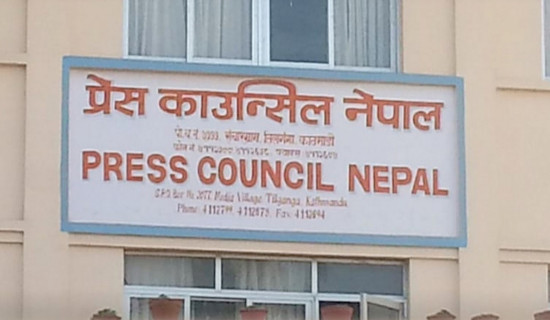- Tuesday, 24 February 2026
Maintain Religious Tolerance
The constitution of our country protects religious freedom, stating that every individual is free to practice any religion s/he desire. However, the constitution also states that no one has the authority to insult another person's faith while practicing their own. Our constitution includes clauses (Articles 26 and 4) that aim at promoting and protecting religious harmony, peace and goodwill in our nation which is rich in its cultural diversity. Lately, many people, mostly Hindus, have claimed that the Minister for Tourism, Civil Aviation, and Culture, Sudan Kirati, has violated these constitutionally protected clauses when he spoke favourably of Christianity at a ceremony last week. Minister Kirati declared at a function in the capital that Christianity is guaranteed by the constitution and that anyone who does not accept this fact is a ‘traitor’.
"If anyone is found violating this constitution clause, they are traitors, and for committing such a crime, we should handcuff them and put them behind bars," said the Minister whose ‘controversial’ statement quickly went viral on social media, and many people criticised him for being anti-constitutional and disrespectful to Hindus. His statement drew the ire of none other than Rabi Lamichhane, chairperson of the Rastriya Swatantra Party, who wrote that Kirati's statement had disturbed social harmony and religious tolerance and was inflammatory and irresponsible that violated official dignity. RPP Nepal leader Kamal Thapa urged for Kirati's dismissal for calling ‘all non-Christians traitors.’
Religious freedom
In our country, everyone has the right to follow their faith in whichever way they see fit. A person is also free not to follow any religion if he or she so chooses. In a secular state, neither the government nor the state may favour any particular religion. People cannot also speak ill of others’ faith while adhering to their own. Many commentators believe Minister Kirati has violated the constitution in this case by undermining the ethos of secularism while publicly endorsing Christianity. After his statement sparked outrage, Minister Kirati attempted to justify himself, claiming that his statement on religious freedom and equality was exaggerated and he urged everyone to read his entire speech in which he discussed minorities' constitutional rights.
Following the minister's statement, many Hindus have expressed their displeasure with him, citing he has offended their religious sensitivities by labeling "all non-Christians” traitors. In a country where Hindus constitute the majority, how can the Minister of Culture publicly support Christianity? They claimed that the Minister had been careless in his job as Minister of Culture because popular Hindu shrines in the country, such as Pashupatinath and others, come under his direct supervision. Meanwhile, proponents of democratic ideals and principles argue that in democracies, political parties, leaders, and ministers have an obligation to protect and advance the interests of the majority of people rather than hurting the sentiments of these people.
Many hardened Hindus, meanwhile, see Minister Kirati’s statement in another light. They accuse some leaders of helping increase in the number of Christians and churches in Nepal. They argue that the conversion of poor Hindus to Christianity with the promise of cash and other generosity is primarily responsible for the increase in the number of Christians in Nepal in recent years. The rate of conversion would have been higher, if the constitution had not forbidden both forceful and the employment of other means for religious conversion. In Nepal, Christian missionary groups and individuals are accused of attracting destitute, illiterate Nepalis from rural and suburban areas and promising them financial and other assistance in order to proselytize them.
According to some commentators, Kirati's party, the CPN-Maoist Centre, which presently leads the government, may find it difficult to defend Kirati as a result of his statement. It may produce electoral repercussions for the party while also infuriating coalition allies who rely heavily on Hindu voters. Since entering mainstream politics and winning a landslide in 2008, the Maoist Centre has been losing support in successive polls. Many political experts believe that by inciting anti-Hindu feelings, Minister Kirati has gravely hurt his own party's chances in the upcoming election. The Maoist Centre that managed to bag only 32 seats in the last general election held in 2022 would likely encounter heavy opposition from Hindu voters in the general election in 2027.
Damage control
Hindu organisations and believers blame the erstwhile rebels for the country's growing Christian population. They also hold the former rebels responsible for removing the Hindu king and transforming the country into a secular state and republic. Kirati's uncalled-for statement sparked outrage, and his party will need to act quickly to contain the damage. Alternatively, the party could choose not to take action against the Minister, who has otherwise acquired popularity by making admirable decisions after assuming his office a year ago. However, his most recent remarks, which, many of his own party men think, he should not have made as a responsible minister, have brought him more flak, putting his ministerial job at risk.
Finally, it should be noted that any religious issue is highly sensitive in a diverse and multicultural country like ours and can elicit strong reactions from people if they feel offended by behaviours or remarks that contradict their religious beliefs. No one should try to incite anti-religious sentiment in a society. And when individuals belong to a position of prominence, the obligation to maintain religious and social harmony, peace and goodwill must become their priority.
(Upadhyay is former managing editor of this daily)
















-original-thumb.jpg)